

How to Make the Most of Wikipedia. Attribution. A couple of days ago, someone shared an image of an anchor chart (for lack of better term) for questioning levels.
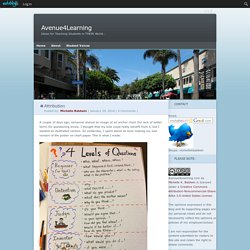
I thought that my kids could really benefit from it, but I wanted an illustrated version. So yesterday, I spent about an hour making my own version of the poster on chart paper. This is what I made: As I started to write the original “creator’s” name at the bottom, I realized I didn’t know who had shared it. I spent a couple of hours (yes, hours!)
Still… no attribution. I don’t believe in using other people’s work without giving them credit. So here’s the deal… teachers love to “steal” each other’s work. If you know whose original work THIS is, please let me know so I can properly credit him/her. Teaching Students To Use Evidence & Reasoning To Support Claims. Education Week. 50 Free Resources That Will Improve Your Writing Skills. Advertisement Today, too many websites are still inaccessible.
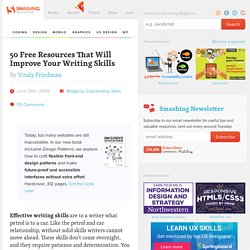
In our new book Inclusive Design Patterns, we explore how to craft flexible front-end design patterns and make future-proof and accessible interfaces without extra effort. Hardcover, 312 pages. Get the book now! Effective writing skills are to a writer what petrol is to a car. Of course, effective writing requires a good command of the language in which you write or want to write. Further Reading on SmashingMag: Link We collected over 50 useful and practical tools and resources that will help you to improve your writing skills. 1.
Use English Punctuation Correctly6 A quick and useful crash course in English punctuation. HyperGrammar7 An extensive electronic grammar course at the University of Ottawa’s Writing Centre. Grammar Girl8 Mignon Fogarty’s quick and dirty tips for better writing. English Style Guide – Economist16 This guide is based on the style book which is given to all journalists at The Economist. Five Strategies to Infuse Common Core State Standards with Social Studies Instruction. Posted by Herff Jones | Nystrom on Friday, June 28, 2013 · 3 Comments The Common Core State Standards are here.
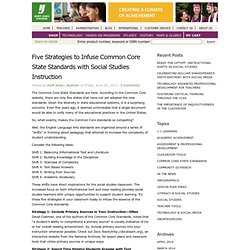
According to the Common Core website, there are only five states that have not yet adopted the new standards. Given the diversity in state educational systems, it is a surprising outcome. Even five years ago, it seemed unthinkable that a single document would be able to unify many of the educational practices in the United States. So, what exactly, makes the Common Core standards so compelling? AdLIT. PIL_2013_FreshmenStudy_FullReport.pdf. Top 10 Characteristics Of Effective Vocabulary Instruction. By Kimberly Tyson, Ph.
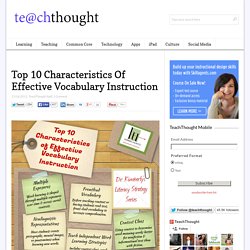
D. of learningunlimitedllc.com We know that there is a strong relationship between vocabulary and reading comprehension. Systematic vocabulary instruction is an integral part of a K-12 comprehensive literacy framework for instruction. I consider it a privilege to have supported many teachers, coaches, & administrators in building a community that values word learning across classrooms and content areas. Common characteristics of effective vocabulary instruction have been documented in numerous professional journals and books.
Effective vocabulary instruction across grade levels and content areas is key. As part of 12 Days: 12 Tools I have shared 4 templates and tools for vocabulary. Tool 1: Top Tips for Words WallsTool 2: Concept CirclesTool 5: Marzano’s 6-Step Vocabulary ProcessTool 7: Alphaboxes Graphic Organizer. Literacy in Social Studies, Science, and Technical Subjects: Scaffolding Levels of Text Complexity (With Discipline-based Texts) Today’s standards in Social Studies, Science, and Technical Subjects require that students comprehend and analyze complex texts and write arguments or informational papers focused on discipline-specific texts.
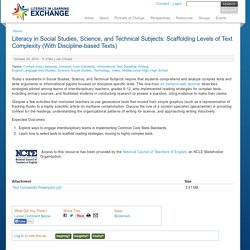
This one-hour on demand web seminar describes strategies piloted among teams of interdisciplinary teachers, grades 6-12, who implemented reading strategies for complex texts, including primary sources, and facilitated students in conducting research to answer a question, citing evidence to make their claims. Glimpse a few activities that motivated teachers to use geoscience texts that moved from simple graphics (such as a representation of fracking fluids) to a highly scientific article on methane contamination. Discuss the role of a content specialist (geoscientist) in providing context for the readings, understanding the organizational patterns of writing for science, and approaching writing inductively.
Expected Outcomes: Clearer and Higher: Why Students Need the Common Core. History / Social Studies Lessons. History/Social Studies.